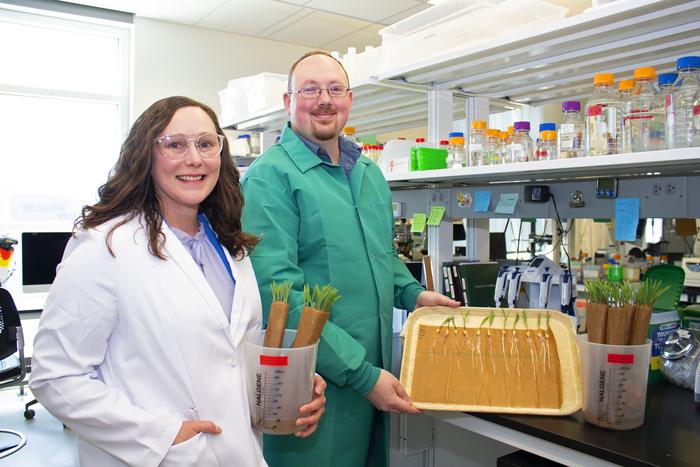AMES, Iowa – A widely found gene in plants has been newly identified as a key transporter of a hormone that influences the size of corn. The discovery offers plant breeders a new tool to develop desirable dwarf varieties that could enhance the crop’s resilience and profitability.

Credit: Whitney Baxter/Iowa State University
AMES, Iowa – A widely found gene in plants has been newly identified as a key transporter of a hormone that influences the size of corn. The discovery offers plant breeders a new tool to develop desirable dwarf varieties that could enhance the crop’s resilience and profitability.
A team of scientists led by Iowa State University spent years working to pinpoint the functions of the gene ZmPILS6. Now, they have been able to characterize it as an important driver of plant size and architecture, a carrier for an auxin hormone that helps govern growth in roots below ground and shoots, or stalks, above ground. Their findings were published in the Proceedings of the National Academy of Sciences (PNAS) this week.
“A hallmark of the current age of science is that we have all this high-quality genome data, whether for corn or humans or other organisms, and now we have the task of figuring out what the genes actually do,” said Dior Kelley, assistant professor of genetics, development and cell biology at Iowa State, who led the research team.
The group used “reverse genetic screening” (from the gene to traits expressed in the plant), combined with other techniques, as they tracked their gene’s role in corn development. Reverse screens require multiple growing seasons and don’t always work, according to Kelley. It took seven years for her group to thoroughly characterize ZmPILS6 and verify it regulates plant growth.
When “knocked out” of modified, mutant plants, its absence suppressed root lateral formation and plant height. The research has led to a provisional patent for its potential to be used in breeding programs to create short stature corn that is still highly productive.
“I think of this as ‘pixie’ corn,” Kelley said. “There’s a lot of interest in it for all kinds of reasons, including reduced use of water and nutrients and its ability to withstand high winds.”
As they studied ZmPILS6 in corn, the researchers made another curious finding: The gene seemed to have opposite effects on plant growth than a comparable gene in Arabidopsis, a plant often used as a model for research.
“This was very unexpected,” Kelley said. “It illustrates that plant proteins, which have evolved in different contexts, can behave differently. It emphasizes the need to study genes directly within key crops of interest, rather than thinking we understand them based on how they work in other plants.”
Kelley gives a lot of the credit for the project’s success to a “great team of collaborators,” especially Craig Cowling, a doctoral student in Kelley’s lab who is the first author on the PNAS paper. “Craig was the one to really dig in, to confirm that this gene carries the plant hormone auxin, and it absolutely controls size in corn.”
“This project and being acknowledged as first author on a paper in this important journal has been a little unbelievable,” Cowling said. “It’s been a long journey for me. I never thought I would go to college when I was in high school in Des Moines, so I went into ROTC and then the Marines, where I worked around the world as a technology specialist. When I got out, I wanted to do something different. Thanks to some good mentors, I’ve figured out that I love working with and understanding plants.”
Kelley calls the new research “foundational” basic research to understand a gene that impacts numerous, complex growth traits, which evolution has conserved through many plants, from algae to maize. “It is also ‘translational,’ in that it links to genetic resources that can be used to improve breeding programs,” she said. “This opens up whole new questions and facets of research for my laboratory.”
The PNAS paper’s other co-authors:
- Jodi B. Callwood, graduate student in Iowa State’s Department of Genetics, Development and Cell Biology;
- Maxwell R. McReynolds, former Iowa State graduate student who is now working in private business;
- Melissa Draves and Jasper Kohr, former Iowa State undergraduates who are now in graduate school elsewhere;
- Justin Walley, assistant professor in Iowa State’s Department of Plant Pathology, Entomology and Microbiology;
- Arielle L. Homayouni and Lucia C. Strader, at Duke University; and
- Haiyan Ke and Katayoon Dehesh, at the University of California Riverside.
This project has been supported by an Agriculture and Food Research Initiative competitive grant through the USDA National Institute of Food and Agriculture and USDA Hatch start-up funding from Iowa State University’s College of Agriculture and Life Sciences.
Journal
Proceedings of the National Academy of Sciences
Method of Research
Experimental study
Subject of Research
Cells
Article Title
ZmPILS6 is an auxin efflux carrier required for maize root morphogenesis
Article Publication Date
23-May-2024



